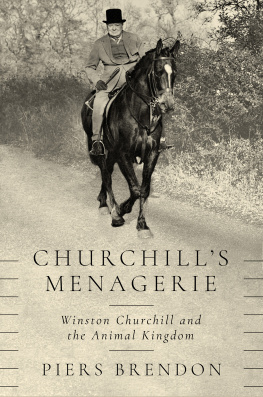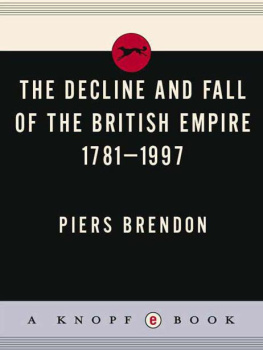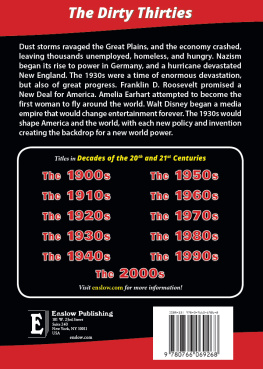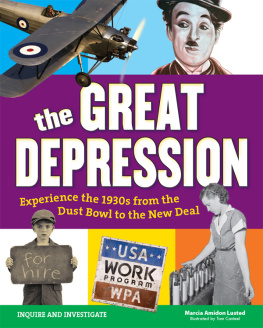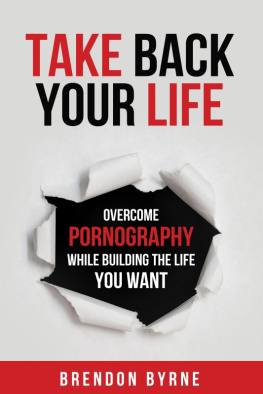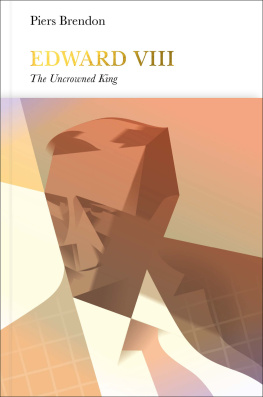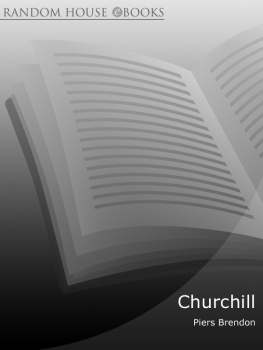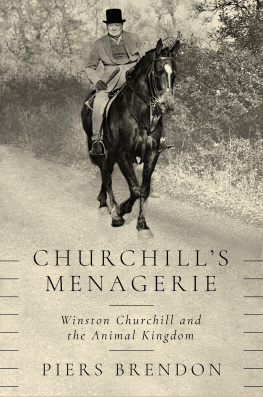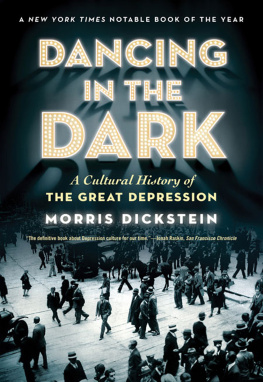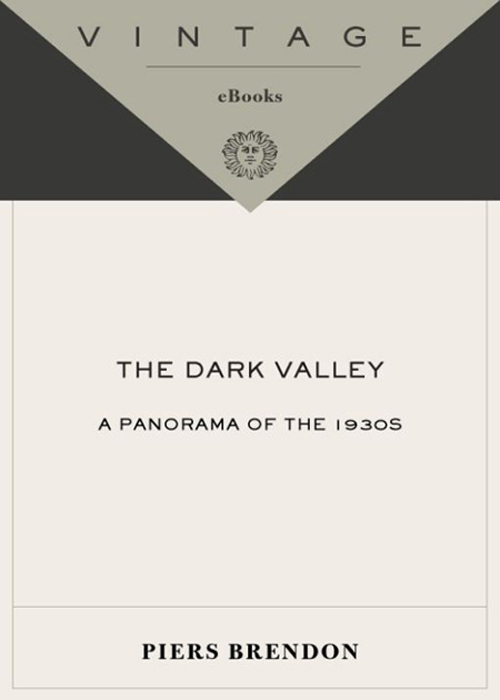
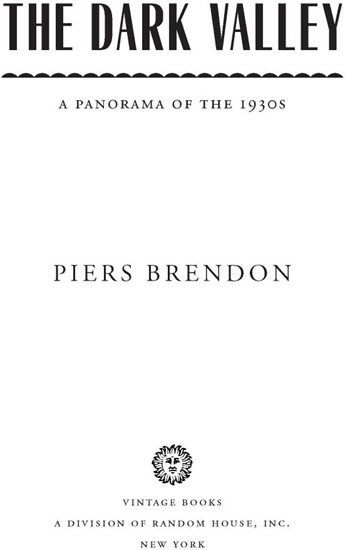
Table of Contents
For Tom Rosenthal
with gratitude and affection
Acclaim for Piers Brendons THE DARK VALLEY
The Dark Valley is brilliantly written and researched, with sweeping perspective and vivid detail.... As this book makes clear, the history of those years contains many lessons that remain valid in this new century.The Dallas Morning News
A wide-ranging, colorful and convincing account of the dismal decade that ended with the outbreak of World War II.The San Diego Union-Tribune
Magisterial.... Brendon writes with the assurance of a novelist. He develops characters, slows down to describe interesting scenes, and demonstrates a fine eye for detail and irony. Business Week
A superlative attempt to re-create the world that passed away in 1939.... Using a deft combination of historical fact, anecdotal material about each nations leaders, and gripping description, Brendon has written a history that even a general reader will have trouble putting down.The Christian Science Monitor
Brendon brings to his study of this grim period much wisdom, learning and writing skill. In the best sense, The Dark Valley is history in the grand manner. Houston Chronicle
Brilliant, cinematic, utterly illuminating.... No other historical account I know can rival this.... Masterly. Financial Times
Immensely impressive.... Piers Brendon writes in a lively way that belies his scrupulous research.... A field day for both lay readers and academic scholars. Richmond Times-Dispatch
Piers Brendon illuminates with nuance and color a miserable and lethal decade. The overall effect is similar to the slightly startled surprise we feel on seeing color photographs of World War II.... The Dark Valley is a fast, fast read despite its bulk. The Florida Times-Union
A majestic and highly readable history of the most distressing of decades.... Compelling and propelled by a gathering momentum, this all but begs for a sequel. Kirkus Reviews
[Brendons] writing is superlative, his vocabulary precise and extensive; he displays remarkable talent for the revealing phrase and the polished anecdote. Publishers Weekly (starred review)
Acknowledgements
THIS book took many years to write and the debts of gratitude which I have incurred are correspondingly heavy.
I must first thank colleagues at Churchill College, Cambridge, who have helped me in many and various ways, notably Natalie Adams, Alan Kucia, Carolyn Lye, Gavin McGuffie, Sharon Maurice, Allen Packwood and Katharine Thomson.
Old friends have been unstinting with aid and advice. Professor P. N. Furbank read several chapters and made characteristically penetrating comments. I owe a lot to Professor Richard Overy. Tom Sharpe cheered me when I flagged. So did John and Maria Tyler, who also read the Spanish chapters. Sydney Bolt recalled the 1930s with wit and wisdom, conjuring up the dramas of the Cambridge Gramophone Society (a Communist Party alias) and singing the old songs with undiminished zest:
The bourgeois keep their women
in beautiful apartments and palaces,
But the tendency of the rate of profit to fall
exposes their worn-out fallacies.
(Or was it phalluses? Sydney wonders.)
Peter Pagnamenta not only read the Japanese chapters, he also masterminded the transformation of some of the British material into two television documentaries on 1939, made by Blakeway Productions. Entitled The World We Lost (produced by Peter Jamieson) and Did We Have toFight? (produced by Rachel Allen), they were shown on Channel Four to mark the sixtieth anniversary of the outbreak of the Second World War. Peter Pagnamenta was Executive Producer for both programmes and although I was credited with writing the script many of the best lines were his.
I must also thank Dr. Melveena McKendrick and Carolyn Cooksey for help, respectively, with Spanish and Italian matters. My sister-in-law, Junko Brendon, assisted over a number of Japanese points. My wife Vyvyen, although preoccupied with her own books, never ceased to believe in mine and to sustain my efforts.
I must acknowledge permission to quote from the following copyright material: to the executors of the late Mr. M. Christie for the Christie Papers; Winston S. Churchill for the Churchill Papers; to Lieutenant-Commander Drax for the Drax Papers; to the Earl of Halifax for the Halifax Papers; to Mrs. E. Le Mesurier for the A. L. Kennedy Papers; to the Hon F. Noel-Baker for the Noel-Baker Papers; and to the Master and Fellows of Churchill College for the Phipps and Strang Papers.
Historians are born to make mistakes and, covering such a lot of ground in this book, I am especially vulnerable to error. However, I have been lucky enough to receive help from a number of distinguished authorities. They have examined the sections of the book in which they are particularly expert and have corrected me in countless ways. Moreover, they undertook this arduous task out of the kindness of their hearts. So I am enormously grateful to Professor Christopher Andrew, who read the French chapters; to Harry Browne, who read the Spanish ones; to Professor Martin Daunton, who read the British ones; to Dr. Jonathan Haslam and Dr. Peter Squire, who read the Russian ones; to Professor Warren Kimball, who read the American ones; to Dr. Stephen Large, who read the Japanese ones; to Dr. Detlef Mhlberger, who read the German ones; and to Professor John Pollard, who read the Italian ones.
One other outstanding and exceedingly busy scholar, Dr. Zara Steiner, who probably knows the 1930s as a whole better than anyone, took on the immense labour of scrutinising the entire book. Her contribution, well above the call of academic duty or personal generosity, is beyond praise and thanks. Needless to say, those who helped me do not always agree with my judgements and I bear the responsibility for any mistakes that remain.
My friend and literary agent, Andrew Best, helped to engender this book. Despite the unconscionable time I took to write it, my publisher Dan Franklin has always been enthusiastic about the book. He has, moreover, provided me with a model editor in the person of Tristan Jonesno one has done more to improve the text. My thanks, too, to Lily Richards, who has done a wonderful job on compiling and selecting the pictures.
Tom Rosenthal originally commissioned the book and he has followed its progress with occasional impatience but with unceasing benevolence. I shall always be grateful for the chance he gave me to write what I wanted to write.
List of Illustrations
FOLLOWING PAGE 108
The Crash (Hulton Getty)
The Inauguration of President Roosevelt (AKG London)
Roosevelt visits the Tennessee Valley Authority (AKG London)
Roosevelt and the forgotten man (AKG London)
Miss Prosperity, 1935 (Hulton Getty)
Hitler and Hindenburg (The Trustees of the Imperial War Museum, London)
Thanksgiving Day, Berlin, 1934 (AKG London)
Mussolini with bust (Wiener Library, London)
Mussolini in Tripoli (AKG London)
Soviet collective farmers on the Gigant Estate (AKG London) Stalin, Molotov and Voroshilov (AKG London)
Stalin (AKG London)
Refugees from the drought in Oklahoma, by Dorothea Lange (Hulton Getty)
FOLLOWING PAGE 364
Fascist Memorials of Honour: Memorial of the Duce in
Next page

